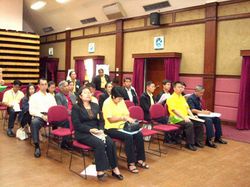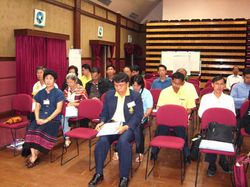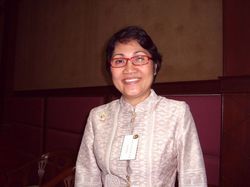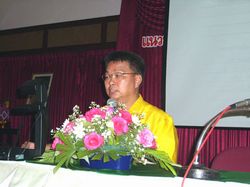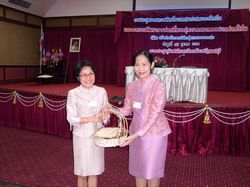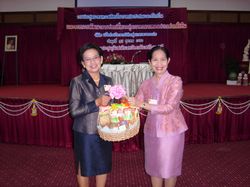Scopes of study
Data collection was carried out in the region of 2 groups of provinces.
According to the time limit, the research team decided to employ the technique of focus group meeting to obtain the information. Each group contains 8 representatives from many organizations and units, led and facilitated by a researcher from the university network.
The target groups of information were representatives from 4 main groups, local business agencies, local governments, officials in the region and community leaders.
The period of study was 3 months, February-April 2007. Methodology
The Context of Social and Economy Changes
It is anticipated that people will contribute more roles in country development. Government should support and promote the citizen in any activity participations as well as decentralization of power. Human resources graduated from regional higher education institutes must be ready to serve community with a higher quality, better knowledge and good moral value to develop and strengthen community system. It has been predicted by demographic research that rate of growth in Thailand has been significantly decreasing, while elderly has been increasing. This phenomenon infers that working generation has to work harder to compensate an increasing number of elderly. On the other words, our next generation has to be 3-4 times more efficiency than our generation to serve a higher number of elderly. It is inevitable to reform the university missions to cope with the change of human resource stream.
The depletion of natural resources and environmental changing will be the more severe problems that create a high impact on human being. Water management is a good example of the natural resource problems, while garbage management is an example of environmental management. These problems are not only serious to Thailand but also to the whole world. Developed countries have issued several acts and regulations related to the environmental conservation as conditions to trade with other countries. Campaign the sense of environmental conservation is not enough to solve the problems. It needs more knowledge and networks to manage the change of natural resources and environment.
As a result of information technology and globalization, Thai economy has been significantly impacted. With a high speed of communications, the competition in economy is very serious. Most developed countries identified themselves as high technology that needs high research investment, while developing countries still involve in mass production with cheap labor. These bring Thailand to the dilemma because our labor cost is higher than China and Viet Nam. Moreover, the free trade has challenged our capability in economic management that the capital has shifted from physical to knowledge. Education is also considered as a service industry that has been strongly shaking our education system.
Thailand has tried and errors in several economic aspects, however the more we tried the wider gap between rich and poor. The big gap between two poles indicates the failure of former economic orientations that stress only investment fund and GDP. There must be something overseen in our society. The senses of caring, sharing, collaborating and trusting have been ignored, but rapidly absorbed the other know-how as well as improper cultures. The Sufficient Economy has contained these social aspects into its philosophy so that its application not only reduces the gap but also strengthens our society. Policy proposal Reference to the strategies and Gross Products Productions (GPP) of both groups of provinces in the low-central region of Thailand, it was found that the production sector has brought a high income, however, the agriculture and service sectors, especially tourism have played important roles in both economic and social aspects. These issues are therefore existed in all provinces’ strategies. According to the academic record of year 2004, it is revealed that graduations in this region are 20,710 with the ratio of social science to science at 3:1. This information infers the unbalance of manpower between social science and science. Human resource in science are significantly insufficient, especially in the area of information technology (IT) that are increasingly required. The universities have to lay out their plan with regard to their mission as follows.
In the process of teaching and learning, it is important to raise 3 questions, what is the special expert of graduations, how to operate the course, and to whom the universities produce manpower for.
The term “Comprehensive University” seems to be the barrier of university development toward specialty. It is time to distinct the core competencies of the universities to promote and become the best in that areas. The curriculums for the low-central regions of Thailand have been proposed by the communities with respect to economic and social contexts are as follows.
It was informed that most graduations are not ready to work. They need more or less of practices and skills before taking charge in any positions. This corresponds to the information from employers to the universities. In the era of globalization and high competition, it is necessary to produce graduations that are ready to work. The recommendations for course operation are as follows.
It is recommended that all steak holders, academic institutes, business sectors in the region, private sectors and local leaders should meet and brain storming to lay out the plans for regional manpower, both short and long terms. The universities could therefore design the curriculums.
The recommendations to universities’ mission in research are as follows.
The recommendations for academic services are as follows.
For art & culture nourishment, the recommendations are as follows.
II. Generate New Innovations of Higher Education Management: Regional network
Although the network operation has several advantages, the network structure is not strong enough to sustain. The issue of how to strengthen the network is still challenged to move forward and extend to other university missions. The network should therefore play an important role to other organization and agencies. It is important to network to consider the following aspects.
The network has to rely on the equity of partners, keep in participation of steak holders, search for alternative opportunities and using them for creation, count on team work and win-win situation.
According to experiences from University Research Network and Research Network in the low-central region of Thailand, that have been working with all universities, local governments, private sectors, local business and communities, it is noted to considered in 2 important approaches.
It is suggested that university network should connect not only universities but also the schools and colleges to generate the mechanism of student exchange and transfer system. The students should be allowed to choose interested subjects across other universities. It is optimistic that the diversity of learning will provide the mechanism of educational standardization and quality improvement.
It is proposed by the community focus groups that higher education should be the leader in connection with outside organizations, both government and private sectors as well as communities, to define problems and lay out direction plans with respect to universities’ competencies and higher education missions. These will lead to the development of contemporary courses corresponding to the change of social and economic contexts.
The key factor to reach the networking management achievement is the coordinator or contact point that facilitates and links all partners both inside and outside higher education together. This person must thorough understand the philosophy of network, good vision in university scope and unify all members from different area to have common perception of network.
It is suggested that government should have the management policy in term of integrated area based and decentralization to local government. The universities network should be considered and supported as the consultants in area development. It is also recommended by community focus group meetings that the government should create mechanism such as regulations and laws to support the cooperation between local governments and universities.
The Commission of Higher Education must have a finite policy in supporting the university networks by providing seed money for the network management, policy budgeting for the network proposals and use the time frame assessment to audit the outcomes. The Commission of Higher Education should also act as a main coordinator to coordinate with other organizations at ministry and government levels to generate networks with them.
Reported by Khun Tuck Dechapanya The material featured in this article is subjet to copyright protection and is protected by the Copyright Laws. A copyrighted work may not be copied, reproduced, distributed or publicly displayed without the consent of the author or copyright owner. Any unauthorized use of this website or any of its contents, in whole or in part, shall be considered copyright infringement. It is illegal for anyone to violate any of the rights provided by the copyright laws to the owner of this copyright. Khun Tuck Dechapanya does not give permision for any other websites and persons to copy or republish any part of this article. |
| Hua Hin Accommodation | Rent Hua Hin | Hua Hin Deals | Hua Hin Property | Hua Hin Expat | Hua Hin |
| Hua Hin Apartments | Hua Hin Condos | Hua Hin Villas | Hua Hin Houses | Hua Hin Vacations | Hua Hin Beach |
| Bangkok Hotels | Thailand Hotels | Thailand Travel | Thailand Pictures |

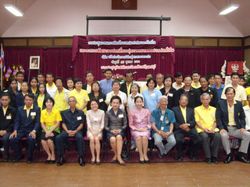 The research project “Community Aspect in Long Term policy plan for Commission of Higher Education: Low-Central Region of Thailand” was conducted by The Research Network of Low-Central Region of Thailand to explore the regional opinions, communities, local governments and officials, in terms of regional higher education missions. The project was funded by the Knowledge Network Institute of Thailand and worked under an umbrella of Research Network Program of Commission of Higher Education.
The research project “Community Aspect in Long Term policy plan for Commission of Higher Education: Low-Central Region of Thailand” was conducted by The Research Network of Low-Central Region of Thailand to explore the regional opinions, communities, local governments and officials, in terms of regional higher education missions. The project was funded by the Knowledge Network Institute of Thailand and worked under an umbrella of Research Network Program of Commission of Higher Education. 